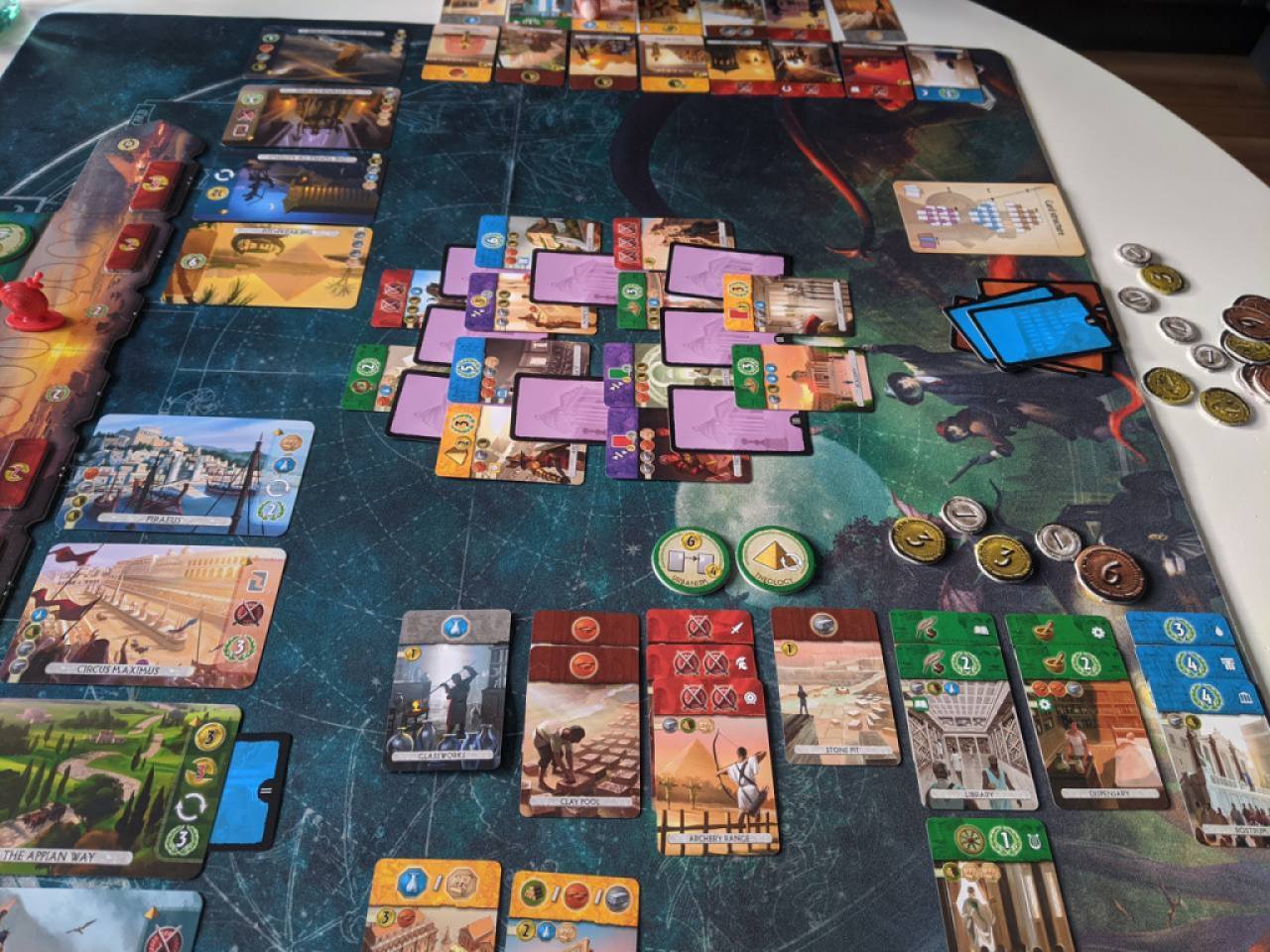7 Wonders: Duel – Review
Civilisation games are tied up in the history of the tabletop hobby. From the early iterations of Frances Tresham’s game that birthed the genre, to modern interpretations like Through the Ages, New Dawn, and of course 7 Wonders.
The latter took the hobby by storm when it came out in 2010. Its simple drafting mechanics gave it an ‘easy to learn, hard to master’ feel. I personally wasn’t a fan but admired the attempt to squeeze a civilisation style game into a small design space. Design constraints bring innovation.
7 Wonders Duel, designed by Antoine Bauza and Bruno Cathala with art by Miguel Coimbra, , came out in 2015. It takes the ideas behind 7 Wonders’ drafting mechanics and distils them into a 2 player game.
Duel takes its cues from its older sibling. Drafting at 2 players is rubbish so the action moves to a space between the two players in a pattern of revealed and hidden cards.

Each player is building a city and every turn they have a very simple set of choices: add a card to their city, discard one for money, or use it to build one of the titular Wonders. Each choice brings you the potential for victory as you work towards a military or science victory, or simply accumulate points if neither of those routes come to pass.
What are these tiny cards though? All sorts of things. Brown and Grey cards are the literal building blocks of the city, Blue is culture (points), Green gives you science, Red is the colour of war, and Gold is unsurprisingly about the economy. A couple of special cards pop up as well that can give you a boost of points based on your strategy.
Each turn you choose and advance. You look over at your opponent and attempt to deny them what they need whilst advancing your own agenda. Yes you need that wood to build one of your Wonders but what will you reveal by taking it? Do you take this card in the hope of seeing its linked one in a later age? A small number of cards from each age are removed at the start of each game though, so you cannot fully rely on an absolute strategy. You will find yourself ducking and weaving through the ages, improvising around what comes up and what is denied.
Of course there must be a sense of progress in a Civilisation game and Duel achieves this through 3 different ages of cards, much like its predecessor. As time progresses cards get more expensive, complicated, and valuable. Cards from earlier ages give you the resources to buy those later, sometimes for free if they are linked. The patterns of hidden and revealed cards change in each age, requiring different approaches and strategies. A subtle mechanic that gives each age its own particular feel.
As the game accelerates through each age the threat of losing becomes more acute with every card drawn. If your opponent is pursuing a military path, do you wager that the cards you reveal by taking the one you want doesn’t see a curious horse pushed up to the gates? Do you let your opponent get closer to a scientific victory, by pursuing your own agenda hoping to put a halt to their plans down the line? This tension is at the core of what makes Duel sing and was something I felt was lacking from the original game.
The nature of the patterns of cards pushes you into cul de sacs of choices. Not only are you deciding what you will do, you are deciding what your opponent can do. This combat isn’t just in the cards. The military track is a tense push and pull, denying money and eventually bringing the game to a close if it is ignored by one side. Resources are limited so you can buy what you need, with the cost determined by what is present in your opponent’s city. The battle of trade wars represented with a deft flick of mechanics. You even battle over the Wonders of the title. Drafting them at the start of the game, they give you another route of points. Each side starts with 4, for 8 total, but only 7 can be built. A race to build them adds another frisson of conflict.
7 Wonders: Duel takes the ideas of its predecessor and distills them into a tight battle. It is easy to teach and play with a web of mechanics that makes every card pulled feel like a significant advancement in your civilisation. Do you pursue science with a military bent? Do you walk a more pacifist path? Maybe the economy is your way through?
Throughout the game your story is carved into stone by your choices. The tale of your history emerges from the cards you choose and the paths you do not walk. This is what eventually sold me on 7 Wonders:Duel. I can see the Civilisation emerge as I play. I can see the people walk the streets rejoicing as the world advances, fearing as the military pushes them to war. The people are captured in wonder as the Pyramids are built. It’s stories that make games shine for me. In 7 Wonders: Duel you can see the whole development of a city in the blink of a lunchtime.

If you enjoyed this article then please consider donating to our Patreon. You can find other ways to support us here.























2 Responses
[…] BGA with my fellow hosts and liked it more than I did, but still not enough to really recommend it. Duel is great […]
[…] Battlecrest enters that arena in a stripped down package and asks “Can you design a compelling Duel game in only 18 […]